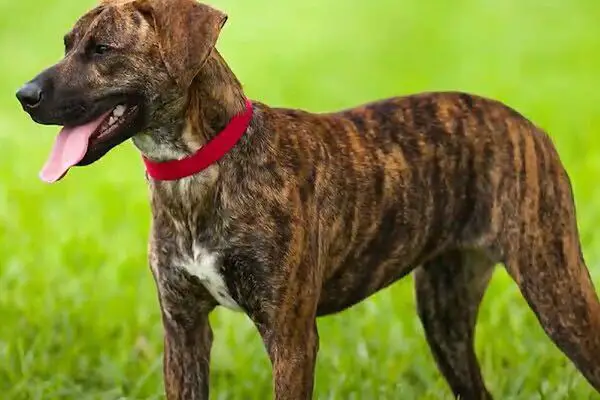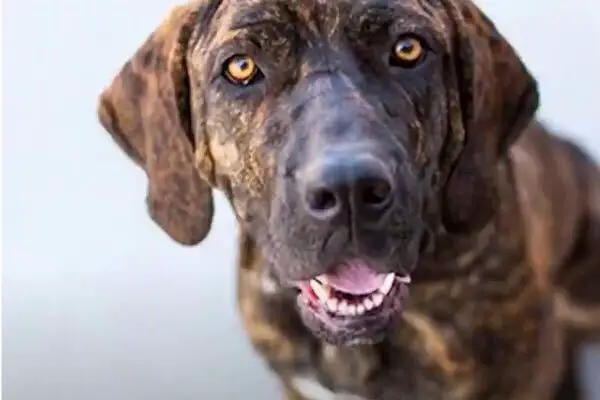The Plott Hound, or Plott for short, is a medium-sized dog that stands at a height of 20 inches. Their streamlined bodies are covered with smooth coats that come in brindle-stripe patterns that range from black with gold to orange with russet colors. They also feature long tails and medium-length ears that hang by their head.
Plotts are hunting dogs and are the best fit for active families who can give them lots of exercise. You shouldn’t get them just because of their unique looks. These dogs can be overwhelming as a pet. They need to be given outlets where they can spend their energy, so they stay behaved indoors.
If you can fulfill the Plott’s needs, he’ll surely dedicate the rest of his time to protect his family. These dogs are affectionate and loving, good with children, and friendly with other pets. The bottom line, they need companionship.

Plott Hound Statistics
| Dog Breed Group | Hound |
| Breed Size | Medium |
| Height | 20-27 inches |
| Weight | 40-70 pounds |
| Lifespan | 12-14 years |
Plott Hound Ratings
| Energy level | |
| Exercise needs | |
| Requires attention | |
| Playfulness | |
| Trainability | |
| Shedding | |
| Grooming | |
| Friendly with family | |
| Friendly with kids | |
| Friendly with strangers | |
| Friendly with other dogs | |
| Prey Drive |
Plott History
Plotts are unique-looking dogs developed in North Carolina more than 200 years ago. Unlike most coonhound breeds, these dogs are of German heritage, descending from five Hanoverian Schweisshund in 1750.
These dogs were accompanied by a German immigrant named Johannes Georg Plott when he came to North Carolina. These dogs were then bred with other breeds, developing a breed with the purpose to hunt bears and other big predators.
As the dogs became popular in the Smoky Mountains of North Carolina, hunters continued to add their own touch to the breed throughout the years. A man named Blevins added the scenting ability and brindle patterns to the dog breed around the early 1900s.
However, these dogs are also more than just hunters. They were home protectors, guardians for children, and can even drive livestock. These days, they are even used for search and rescue and tracking wildlife.
By the year 1946, the United Kennel Club finally recognized the dog breed. And by 1989, the breed was named the official state dog of North Carolina.
The American Kennel Club, however, took longer to recognize the breed in 2006. Now, the dogs rank 171st as the most popular dog in the US and are still considered rare. As some of them continue to accompany hunters, others showcase their skills in show rings.
Plott Hound Temperament
Plotts are loyal, alert, and intelligent dogs. They love protecting their families, particularly kids. However, even if that’s the case, they are not the dogs to get just because you need guardians. These dogs can be overwhelming to take care of, especially for inexperienced owners.
They need attention and lots of exercise. So, take them out for long daily walks. If you have a large, securely fenced yard, you can let them run around on their own, too. But, be sure to keep close supervision. If you can arrange play sessions, the better as they are happier to spend time with their owners.
Plott Hounds can be reserved when it comes to strangers. Expect them to bark when he sees someone suspicious enter your home. They will also stand guard and alert and will be ready to protect in case they’re needed.
Although generally good with children, you still need to keep close supervision to toddlers. As for other pets, these dogs are used to coming in packs, so expect them to get along well with other pets.
True to their hound origins, Plotts can be independent and stubborn. They need someone consistent and firm to make him obey.
Socialization is critical, too, to make them more well-rounded. This will also keep aggressiveness at bay as they get accustomed to meeting new people or animals. It will also help them get used to new situations thrown at them.

Plotthund Care Requirements
- Nutrition: Plotts should do well on high-quality and well-balanced meals every day. Their food should contain the right balance of all the essential nutrients – proteins, fats, and carbohydrates – to help their growth. You must only buy high-quality food for your dog, regardless if you’re serving them home-cooked meals or dog food. Your dog’s meals mustn’t contain fillers, additives, and by-products as these have low nutritional value. Other than great sources of proteins, fats, and carbohydrates, you should also add fruits and vegetables to your dog’s diet. This way, they’ll be able to digest their food better. You should also note any ingredients your dog may be allergic to and make sure to stay away from those. It’s essential to watch your dog’s daily calorie intake. This usually depends on their age, activity level, and metabolism, so it’s best to ask your vet for advice on this.
- Grooming: Plotts have fine smooth coats that shed occasionally. These coats require minimal maintenance, which usually involves weekly brushing and occasional baths to remove doggy odor. Ears and nails should be checked regularly. Make sure that you clean those ears out to prevent ear infection. Nails should also be kept short as long nails can cause pain and discomfort to your dog.
- Exercise: Plotts are energetic dogs that require lots of exercise daily. You can take them out for long walks or runs. Another option is to play with them in a large, securely fenced yard. It’s also important to note that their minds should also be exercised as much as their bodies, so create activities that will help stimulate them physically and mentally.
- Health: Plotts are generally healthy dogs, but they are also susceptible to several health conditions. Some of the usual diseases to watch out for include: hip and elbow dysplasia, hypothyroidism, von Willebrand’s disease, and other eye diseases. However, one of the most common that you should watch out is bloating. This is why serving your Plott the right nutrition is essential. You shouldn’t let them go and exercise after they’ve just finished eating, and their meals should be on minimum portions. You can let your dog take some screening tests to detect certain diseases early. We also recommend meeting at least one of your dog’s parents to know what diseases your dogs might acquire. It’s also best to continuously and closely monitor your dog’s behavior. If you notice any changes, take him immediately to the vet.
- Lifespan: The life expectancy of Plotts is 12-14 years.
Famous Plott Hounds
Tige and Boss: The foundation of all Plott Hound today
Fun Facts about Plott Hounds
- Plotts were developed in North Carolina around the 18th century.
- They were bred by the Plott family, hence the name.
- All their coats are brindled even if they come in color combinations.
- They are the state dog of North Carolina.
- These dogs are also used by the police for tracking and hunting.
- They were recognized by the American Kennel Club in 2006.
Check Out Other Hound Dog Breeds:
Afghan Hound, American English Coonhounds, American Foxhound, Basenjis, Basset Hound, Beagle, Black and Tan Coonhound, Bloodhound, Bluetick Coonhound, Borzois, Cirnechi dell’Etna, Dachshund, English Foxhound, Grand Basset Griffon Vendeens, Greyhound, Harrier, Ibizan Hound, Icelandic Sheepdogs, Irish Wolfhound, Norwegian Elkhound, Otterhound, Petit Basset Griffon Vendéen, Pharaoh Hounds, Portuguese Podengo, Redbone Coonhound, Rhodesian Ridgeback, Salukis, Scottish Deerhounds, Sloughis, Treeing Walker Coonhound, Whippet
